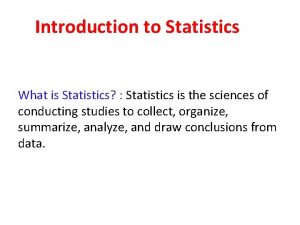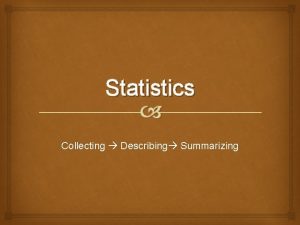Math 145 Statistics is the science of collecting








- Slides: 8

Math 145

Statistics is the science of collecting, analyzing, interpreting, and presenting data. Two kinds of Statistics: 1. 2. Descriptive Statistics. Inferential Statistics. A statistical inference is an estimate, prediction, or some other generalization about a population based on information contained in the sample. Use a representative sample.

Sampling Designs 1. 2. 3. 4. Simple Random Sampling. Systematic Random Sampling. Cluster Sampling. Stratified Random Sampling with Proportional Allocation.

Simple Random Sampling Ø A sampling procedure for which each possible sample of a given size has the same chance of being selected. Ø Population of 5 objects: {A, B, C, D, E} Take a sample of size 2. Possible samples: {(A, B), (A, C), (A, D), (A, E), (B, C), (B, D), (B, E), (C, D), (C, E), (D, E)} Random number generators Ø Ø Ø

Systematic Random Sampling Ø Ø Ø Step 1. Divide the population size by the sample size and round the result down to the nearest number, m. Step 2. Use a random-number generator to obtain a number k, between 1 and m. Step 3. Select for the sample those numbers of the population that are numbered k, k+m, k+2 m, … Ø Ø Ø Expected number of customers = 1000 Sample size of 30 m = 1000/30 = 33. 33 Suppose k = 5. Then select {5, 5+33, 5+66, …}

Cluster Sampling Ø Ø Ø Step 1. Divide the population into groups (clusters). Step 2. Obtain a simple random sample of clusters. Step 3. Use all the members of the clusters in step 2 as the sample.

Stratified Random Sampling with Proportional Allocation Ø Ø Ø Step 1. Divide the population into subpopulations (strata). Step 2. From each stratum, obtain a simple random sample of size proportional to the size of the stratum. Step 3. Use all the members obtained in Step 2 as the sample. Ø Population of 10, 000 with 60% females and 40% males Ø Sample of size 80. 48 females (from 6, 000) and 32 males (from 4, 000).

Homework 1. Answer # 1, 2, 5, 7, 10. on page 18.















